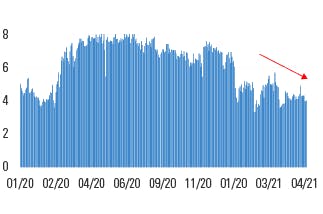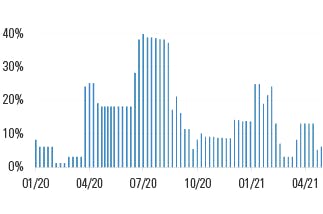Flash Note

Fixed income markets: how to take advantage of interest rate and inflation risks?
- Published
-
Length
3 minute(s) read
An increasingly complex fixed income environment
Although the health situation is improving, thanks to a marked acceleration in vaccination campaigns (particularly in developed countries), the positive outlook for a return to normality heralds the resurgence of fears linked to rising interest rates and inflationary expectations. These concerns have already been confirmed since the beginning of the year, mainly in the United States and Europe.
-
Impact on fixed income markets

A complex situation characterized by negative performance for a large majority of bond assets since the beginning of the year.
-
The consequence for investors

Low returns that could be further impacted by a rise in interest rates, particularly in the case of traditional or passive management.
So how can we manage - and exploit - these risks of rising interest rates and inflationary expectations in fixed income markets?
It requires a fundamentally active fixed income solution, with all the necessary tools to confront these risks and transform them into a source of performance.
Active risk management in all market environments
Carmignac Portfolio Flexible Bond is a fixed income asset allocation strategy designed to seize global opportunities in these markets, while systematically hedging currency risk. With its broad investment universe and flexible management of modified duration, the Fund is able to take advantage of both downward and upward movements in interest rates or inflation, while actively managing risk.
-
Protection against interest rate risk and transforming it into a performance driver
Active modified duration management within the Fund since the beginning of 2020

Thanks to its wide modified duration range between -3 and +8, the Fund can implement short strategies on all yield curves for all maturities. Carmignac Portfolio Flexible Bond can even go beyond reducing or neutralising interest rate risk by using derivatives to achieve negative modified duration, either on a specific yield curve or at the Fund’s level.
-
Turning inflationary risk into a performance driver
Evolution of the Fund’s exposure to inflation strategies since the beginning of 2020

The Fund has access to all segments of the fixed income universe, allowing it to implement inflation strategies by investing in inflation-indexed bonds or "break-even” inflation bonds, both in Europe and internationally. It is thus able to manage its exposure dynamically depending on the level of inflationary expectations in order to exploit them.
Source: Carmignac, 30/04/2021.
Did you know?
Carmignac Portfolio Flexible Bond combines a top-down approach with a bottom-up implementation of interest rate and credit strategies: the portfolio is constructed on the basis of the managers' convictions in each segment of the fixed income universe and an in-depth analysis of the markets. They benefit from the expertise of the entire management team and of our credit, emerging debt and financial debt specialists.
In practice: managing periods of rising interest rates and inflation
In the current environment, the interest rate and inflation strategies implemented in the Carmignac Portfolio Flexible Bond portfolio reflect our specific views on certain economies for which we are expecting monetary policy normalisation or strong inflationary pressures. We also adjust the calibration of these strategies tactically, depending on the level of valuations.
Source: 26/05/2021.
Carmignac Portfolio Flexible Bond A EUR Acc
Recommended minimum investment horizon
Lower risk Higher risk
INTEREST RATE: Interest rate risk results in a decline in the net asset value in the event of changes in interest rates.
CREDIT: Credit risk is the risk that the issuer may default.
CURRENCY: Currency risk is linked to exposure to a currency other than the Fund’s valuation currency, either through direct investment or the use of forward financial instruments.
EQUITY: The Fund may be affected by stock price variations, the scale of which is dependent on external factors, stock trading volumes or market capitalization.
The Fund presents a risk of loss of capital.

